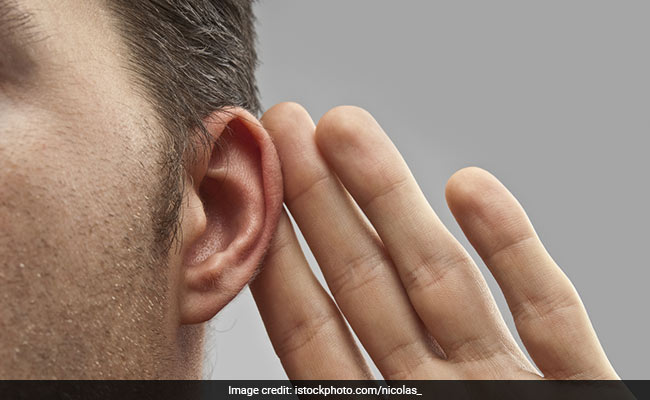Age-related hearing loss is called presbycusis. It is due to various changes in the inner ear such as a change in the blood flow to the ear, impairment in the nerves responsible for hearing and more.

Age-related hearing loss: Presbycusis cannot be prevented but can be managed
HIGHLIGHTS
- Age-related hearing loss is called presbycusis
- Various changes in the inner ear can lead to presbycusis
- Age-related hearing issues are not life-threatening
Old age brings with many changes in your health and the way your body functions, with its own set of problems that can make life challenging. Among the most common problems that the elderly face, hearing loss remains a prominent one. Hearing issues are so widely prevalent that one in two adults aged over 65 years is affected by some degree of hearing loss. Age-related hearing issues are not life-threatening. However, hearing loss in the elderly is a problem which isn't addressed according to the needs of the person dealing with it. Many elderly patients who present with progressive hearing loss struggle to cope with their daily social life and deal with depression/anxiety due to their inability to communicate. Deafness sometimes isolate the elderly, which can eventually lead to depression and dementia.
What are the causes of age-related hearing loss?
Age-related hearing loss is called presbycusis and it occurs gradually over time. It is due to various changes in the inner ear such as a change in the blood flow to the ear, impairment in the nerves responsible for hearing, damage in the tiny hairs (responsible for transmitting sound to the brain) in the ears, change in the structure of the inner ear or change in the way brain processes speech and sound. It can also be caused due to other issues like diabetes, poor blood circulation, smoking, prolonged exposure to loud noise and use of certain medications.
What are the symptoms?
- Elders not able to understand conversations over the phone
- Asking people to repeat the conversation
- Constant ringing in the ears
- Asking to increase the volume of television louder than normal
- Difficulty in hearing while at noisy places

Difficulty in hearing while at noisy places can be a sign of presbycusis
Photo Credit: iStock
How to cope with hearing loss?
The elderly should be encouraged to talk to doctors if they have the above symptoms. Few steps to cope with hearing loss:
- Do not be shy to accept that you have a hearing problem
- Request people who communicate with you to face you while speaking
- Ask them to be slow and clear with what they speak
- Let the person communicating with you talk louder and also know whatever he or she conveyed is understood
- While communicating, it is good to stay away from noisy places
Also read: Do Get Your Hearing Checked Regularly? Here's Why You Must
If you are having hearing issues, it is better to seek professional advice immediately. Based on the condition, it can either be diagnosed by your family doctor or otolaryngologist (ear, nose and throat doctor) or an audiologist who can identify and measure hearing loss. When a person with profound hearing loss no more benefits from hearing aids, either in one ear or both, further evaluation needs to be done to provide implantable hearing solutions. For individuals with bilateral hearing loss/single sided hearing loss/assymetrical hearing loss, cochlear implants can provide great relief. This is a simple electronic device for people with severe hearing loss. It has an external part that sits behind the ear and a second part that is surgically placed below the skin.
Also read: Why Many Shy Away From Hearing Aids And Over-The-Counter Devices
While age-related hearing loss cannot be prevented, some measures can stop it from getting worse. Elderly with hearing issues should stay away from loud noises, and wear proper ear protection such as noise cancelling ear plugs when in the proximity of loud sounds.
Seeking help early can drastically improve the quality of life of the elderly, who often forget to care for themselves in their silver years. Age-related hearing loss need not be a cause of embarrassment, rather the elderly must be empowered to enjoy the last decade of their life in the best way possible!
(Dr. Rohit Udaya Prasad, Consultant - ENT & Cochlear Implant Surgery, Aster RV Hospital)
Disclaimer: The opinions expressed within this article are the personal opinions of the author. NDTV is not responsible for the accuracy, completeness, suitability, or validity of any information on this article. All information is provided on an as-is basis. The information, facts or opinions appearing in the article do not reflect the views of NDTV and NDTV does not assume any responsibility or liability for the same.
DoctorNDTV is the one stop site for all your health needs providing the most credible health information, health news and tips with expert advice on healthy living, diet plans, informative videos etc. You can get the most relevant and accurate info you need about health problems like diabetes, cancer, pregnancy, HIV and AIDS, weight loss and many other lifestyle diseases. We have a panel of over 350 experts who help us develop content by giving their valuable inputs and bringing to us the latest in the world of healthcare.














